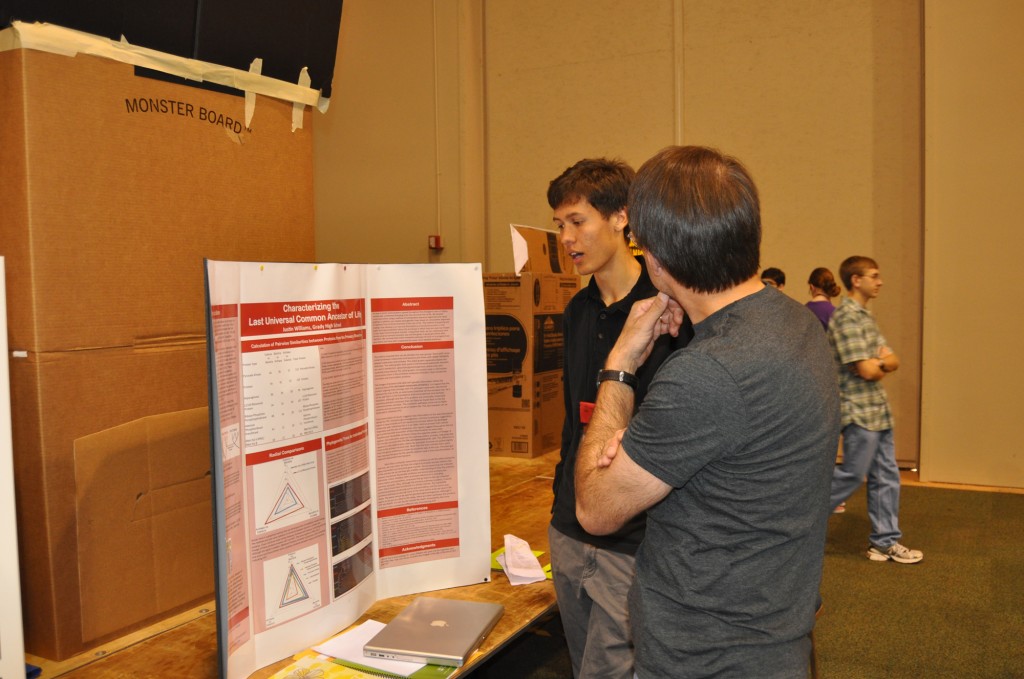
Junior Justin Williams had originally planned to have his science fair project professionally printed on a posterboard. The day before his project was due, however, the company informed him that his poster would not print in time, and he decided to thumbtack it together.
“I was left with one option,” Williams said. “I essentially took my science fair paper and all my figures and tacked it to my science fair board.”
This method did not work out in Williams’ favor. When he presented this version of his project to AP Statistics and AP Calculus teacher Andrew Nichols for the first due date, he was not chosen to participate in the school fair, but after he got the printed version and presented it to his science teacher, he was able to advance to the APS fair.
Williams, along with five other Grady students, advanced to the state level in the science and engineering fair, and of those six, three were chosen to attend the international level. Juniors Troy Kleber, Justin Williams, Regan Lowring and Rachel Citrin, along with sophomore JD Capelouto and freshman Daniel Tehrani have all reached the state level or beyond with project topics ranging from the effectiveness of a new method of mapping and analyzing the structure of proteins to the effect of climate change on the frequency and intensity of hurricanes.
Williams was not the only student to experience a project emergency. Capelouto lost some of his data and analysis when his computer malfunctioned. After staying up past midnight working on his project, Capelouto forgot to save some of his work. When his computer restarted on its own, he lost some of his findings. Fortunately, it was not immediately before any due dates, and he was able to easily redo his work.
“[Redoing] it did not take that much time,” Capelouto said.
The advancing projects shared one common trait: the huge time commitment involved in making them.
“[It took] a lot [of time] because I would collect a sample every 24 hours,” Lowring said. Lowring’s project studied E. Coli found in a stream outside his house and how long it took these bacteria to reach a base after collected.
Capelouto also made a significant time commitment.
“It was definitely a lot [of time] because it was lots of data collection and there was lots of analysis involved,” Capelouto said.
Nichols considered the projects academically beneficial for the students.
“I think the most valuable thing is that the student understood their project,” Nichols said.
Williams worried more about the judges’ understanding of his complex project than his own.
“Actually, at the school fair there were several Emory University biology students and doctors [judging], people who were fairly knowledgeable in my field,” Williams said. “In the APS fair, they were all high school teachers.”
The clarity of his project was not the only thing Williams worried about. At the APS level of the science and engineering fair, one judge asked Williams a question comparing his project, which follows evolutionism, to creationist theory.
“[The question] made me uncomfortable,” Williams said.
To help students prepare for their presentation to the judges at the state level, Georgia Tech professors came to Grady to advise students on their projects and presentations.
“It was really helpful,” Lowring said. “After the citywide fair they only gave one or two comments. The Tech professors gave a lot of good feedback.”
Nichols believes the math fair is worth all the time and effort.
“It gives them an opportunity to communicate their understanding to adults, which you do not get to do often in a high school classroom,” Nichols said.
Before they attended the state fair, the participating students were excited.
“It’ll be really fun,” Lowring said. “I have never done anything like this. It is something I like to do. I like the environment and learning about stuff.”
Williams received a Grand Award at the state-level competition, placing his project among the top 10. His project was also awarded “Best in Genetics.” Lowring won the Broad River Watershed Association Award. Citrin won the NOAA Gray’s Reef National Marine Sanctuary Award as well as the American Meteorological Society award. She also received a third-place award.
Williams said one of the benefits of winning the state level was the scholarship opportunities that came with it.
“There are a whole bunch of scholarship opportunities and camps you can get into,” Williams said. “At the state level I was interviewed by two professors of biofermatics at UGA, and they both asked me to come work with them at UGA [to prepare for International Science and Engineering Fair.]”
The highest level of the fair is the International Science and Engineering Fair. Kleber, Tehrani and Williams will be representing Grady. The fair takes place from May 13 to 17, at the same time as AP testing. This, however, should not be a problem for competitors.
“The great thing is they have an AP exam center right there, so you can present your science fair, walk out and take the exam, then come back,” Williams said.







